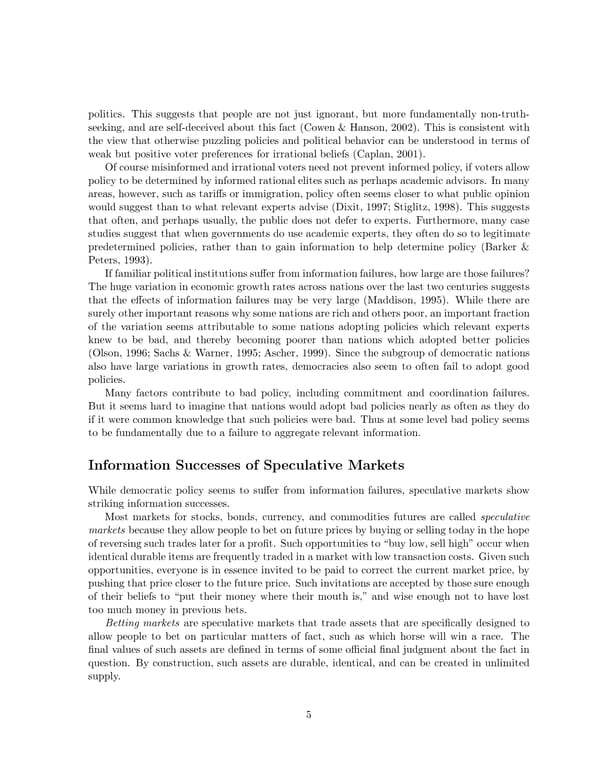politics. This suggests that people are not just ignorant, but more fundamentally non-truth- seeking, and are self-deceived about this fact (Cowen & Hanson, 2002). This is consistent with the view that otherwise puzzling policies and political behavior can be understood in terms of weak but positive voter preferences for irrational beliefs (Caplan, 2001). Ofcourse misinformedand irrationalvoters need not prevent informed policy, if voters allow policy to be determined by informed rational elites such as perhaps academic advisors. In many areas, however, such as tariffs or immigration, policy often seems closer to what public opinion would suggest than to what relevant experts advise (Dixit, 1997; Stiglitz, 1998). This suggests that often, and perhaps usually, the public does not defer to experts. Furthermore, many case studies suggest that when governments do use academic experts, they often do so to legitimate predetermined policies, rather than to gain information to help determine policy (Barker & Peters, 1993). If familiar political institutions suffer from information failures, how large are those failures? The huge variation in economic growth rates across nations over the last two centuries suggests that the effects of information failures may be very large (Maddison, 1995). While there are surely other importantreasons whysomenationsarerichandothers poor, animportantfraction of the variation seems attributable to some nations adopting policies which relevant experts knew to be bad, and thereby becoming poorer than nations which adopted better policies (Olson, 1996; Sachs & Warner, 1995; Ascher, 1999). Since the subgroup of democratic nations also have large variations in growth rates, democracies also seem to often fail to adopt good policies. Many factors contribute to bad policy, including commitment and coordination failures. But it seems hard to imagine that nations would adopt bad policies nearly as often as they do if it were common knowledge that such policies were bad. Thus at some level bad policy seems to be fundamentally due to a failure to aggregate relevant information. Information Successes of Speculative Markets While democratic policy seems to suffer from information failures, speculative markets show striking information successes. Most markets for stocks, bonds, currency, and commodities futures are called speculative markets because they allowpeople to bet on future prices by buying or selling today in the hope of reversing such trades later for a profit. Such opportunities to “buy low, sell high” occur when identical durable items are frequently traded in a market with low transaction costs. Given such opportunities, everyone is in essence invited to be paid to correct the current market price, by pushing that price closer to the future price. Such invitations are accepted by those sure enough of their beliefs to “put their money where their mouth is,” and wise enough not to have lost too much money in previous bets. Betting markets are speculative markets that trade assets that are specifically designed to allow people to bet on particular matters of fact, such as which horse will win a race. The final values of such assets are defined in terms of some official final judgment about the fact in question. By construction, such assets are durable, identical, and can be created in unlimited supply. 5
 Shall We Vote on Values, But Bet on Beliefs? Page 6 Page 8
Shall We Vote on Values, But Bet on Beliefs? Page 6 Page 8